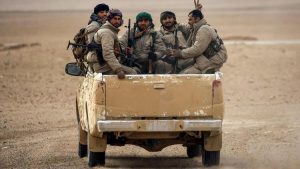Raqqa in northern Syria is a broken city in the midst of a long, arduous rebuild. But it’s no longer the nerve center for the Islamic State’s mission of carnage. Syrians, the U.S., Europe and the rest of the world can thank Syrian Kurdish fighters for that, like reported by chicagotribune.com.
Syrian Kurdish forces led offensive to retake Raqqa, and were instrumental in routing Islamic State militants from much of the rest of northern Syria. Now, the U.S. has a new assignment for Kurdish fighters: Police Syria’s borders with Turkey and Iraq, to ensure that remnants of Islamic State don’t coalesce into any kind of comeback.
The Pentagon was right to train and arm Syrian Kurds ahead of the offensive to retake Raqqa. Syrian Kurdish fighters had amassed an admirable track record against Islamic State across northern Syria. Their deployment as a border security presence makes just as much sense.
As a builder of Sharia-ruled strongholds, Islamic State is absent. But the group isn’t entirely gone: Its militants continue to inspire, through their online capabilities and through attacks on Western targets with knives and trucks. And while they no longer maintain a hold on urban centers, pockets of Islamic State fighters remain along the Euphrates River Valley, near the border of Iraq and Syria, as well as in desert stretches of both countries.
A Syrian Kurdish-led force would stabilize the porous, no-man’s land along the Syrian border. The U.S. has begun training Syrian Kurds for their new task, and the goal is to, over the next few years, build up a force of up to 30,000 fighters.
That has incensed Turkey, which regards the Kurdish force in Syria as an extension of the Kurdistan Workers Party (PKK), a separatist group in Turkey that Ankara labels as a terror organization.
Turkey, a NATO member and an increasingly difficult Western ally, is talking tough about Syrian Kurds as border troops. “Our duty is to drown this army of terror before it is born,” Turkish President Recep Tayyip Erdogan said this week. Turkish troops along the border have begun shelling Syrian Kurdish fighters in the Syrian town of Afrin, and Ankara says it’s beginning preparations for an assault on the Kurdish contingent there.
This isn’t the first time Turkey has been rankled by America’s reliance on Syrian Kurd fighters in Syria. Turkey angrily denounced the U.S. bid to train and arm the Syrian Kurd-led offensive on Raqqa, the Islamic State’s self-proclaimed capital. Nevertheless, the Trump administration should stand its ground. The Euphrates River Valley is an expanse of nearly 4,000 square miles that Islamic State still controls. The militant group’s top leaders are believed to be hiding there. Neither the U.S. nor any other country with a stake in the Middle East can afford to ignore that.
There’s another reason why keeping Kurdish forces engaged in Syria is the right tack to take. They serve as an important counterpoint to the influence imposed by Russia and Iran — two governments that back Syrian strongman Bashar Assad and his bid to eventually retake territory Damascus lost after years of civil war. Like Turkey, Russia and Iran oppose a Syrian Kurdish border force.
Turkey, Iran and Russia, however, need a little memory jogging. Each country has been hit hard by Islamic State terror attacks. If the Syrian Kurds can help keep Islamic State from re-emerging in eastern and northern Syria, that’s good for all parties. And if a Kurdish security presence in Syria keeps Assad from regaining complete control over a country he helped wreck, then that’s good for Syrians, and for the U.S.



